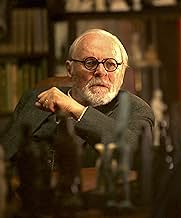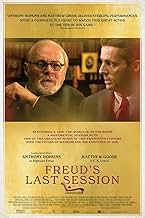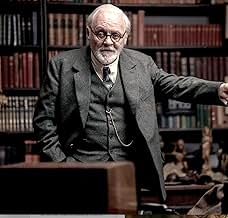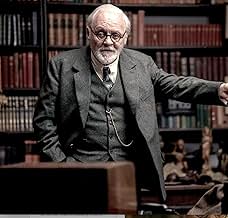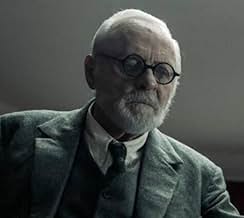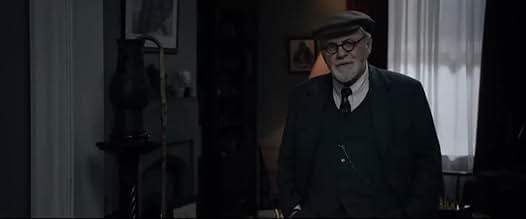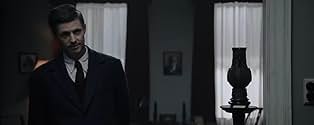Ajouter une intrigue dans votre languePsychoanalyst Sigmund Freud invites professor C.S. Lewis to debate the existence of God, Freud's unique relationship with his daughter, and Lewis' unconventional relationship with his best f... Tout lirePsychoanalyst Sigmund Freud invites professor C.S. Lewis to debate the existence of God, Freud's unique relationship with his daughter, and Lewis' unconventional relationship with his best friend's mother.Psychoanalyst Sigmund Freud invites professor C.S. Lewis to debate the existence of God, Freud's unique relationship with his daughter, and Lewis' unconventional relationship with his best friend's mother.
- Prix
- 1 nomination au total
- Paddy Moore
- (as George Clarke)
- Ilsa
- (as Anna Blomeyer)
Avis en vedette
For a very basic overview, Freud's Last Session imagines a fictional encounter-which may or may not have actually occurred-between the titular psychoanalyst (Anthony Hopkins) and Christian apologist C. S. Lewis (Matthew Goode). As the two trade philosophical worldviews in Freud's home, the doctor's daughter Anna (Liv Lisa Fries) struggles with her own relationship with her famous father alongside a closeted relationship with colleague Dorothy Burlingham (Jodi Balfour).
I'm not entirely sure if Freud's Last Session has ever been produced as a stage play, but if so that might actually be the better format for it. With the core of the film being an intellectual sparring match between two academics, it's a bit of an odd fit for a big-screen format or presentation. Brown tries to flesh things out with the Freud daughter plotline and various flashbacks, but those avenues feel a bit forced and ultimately serve to take the focus off the "main event".
Fortunately, the movie has two things squarely in its corner: First, the back-and-forth repartee truly does raise some food for thought (if treading somewhat familiar religion vs atheism ground). A few lines really stuck with me. Secondly, Hopkins continues to provide transformative performances. Fans of his won't regret the admission just based on his turn alone here.
Overall, I settled on 7/10 stars for Freud's Last Session. Technically it isn't even "that good" of a flick, but the Hopkins performance and general setup are enough that those even nominally interested in the premise can find enough to enjoy.
Adapted from Matt Brown's play, the material is poorly translated to the screen which doesn't allow a solid 15 minutes with both of those characters alone in their session without coming back and forth between some background moments from each character, or either some present situations with the threats of bombing or Freud's poor health that needs constant care from his daughter, of which we have some tense revelations about her relationship with her dominating father. And they tried so hard to make it a plot twist when it comes about that character and her secretary that it was annoying - specially if you know that while Freud didn't condemn homosexuality as a moral issue, he didn't want them near him (read Paul Roazen's works on him).
One sort of expects this being a psychoanalysis session rather than a weird chatting between famous authors with opposite views. For the life of me, as it wasn't a session in fact, I still don't have a clue on what Lewis was doing there. The verbal duels are the moments we wait for, there are so many interesting bits and exchanges between them but as a whole it all falls flat because either the dialogue is not that brilliant; the editing makes it all look like a tennis match - there's not a single moment for some monologue or some plan sequence; and the constant sidetrack of past moments that tries to build some character, or show some background but it's all disengaging and tedious.
A film that works with such ideals and challenges about mankind, God, faith and human relations while opposed or favorable to all that must have some coherence between action and dialogues, to create something that we in the audience might have question ourselves or haven't thought about. It must create some excitment even if those issues aren't all that thrilling (to some) and stay in the "boring" play format without distractions. If there's a play and film adaptation that translated such sentiment in a brilliant way was "The Sunset Limited", with Samuel L. Jackson and Tommy Lee Jones. Simple through actions as it stays in a small apartment room and the brilliance from the complex dialogues becomes a fascinating and mindblowing experience. Hopkins and Goode don't share the same dynamic despite being good performers. The excessive use of humor and the many interruptions in their digressions didn't help, and we perceive them as bitter figures that don't reach any enlightning conclusion.
Here's a film that crushed any previous and possible good expectations that I could have about presenting a challenging duel of opposed views from great minds of the 20th century, starring two favorite actors of mine. Its flawed and distractive presentation left me emptied out and waiting for more. Sadly, it delivered so little that either Freud and Lewis still became mysteries to me, and only their works or books about them will solve a little such mystery. I'd rather see Freud's first session, instead. 5/10.
Freud's Last Session is part of a cottage movie genre, almost always taken from a Broadway play, where two-man shows are relatively common. The author puts two historical figures together in a room and lets them debate various important issues for close to two hours. Nixon/Frost is the one I remember offhand, but there have been others as well. In the theater - a small theater - I can see this working well. I'm not sure how it works as a movie, or more to the point: for whom it works. Movies, even modest ones like this, cost a LOT more to produce than plays. Can something like this recoup the investment?
Yes, the two actors give very fine performances. People go to see Shakespeare plays not to see what will happen to Hamlet or Romeo and Juliet. They already know before they enter the theater. They go to see how the actors will deliver the lines.
But here, unlike in Shakespeare, the lines are not particularly striking. Hopkins in particular did a great job of creating the character Freud, but he didn't have Shakespeare's words - or even, say, those of the playwright who wrote The Lion in Winter - to work with.
So I'm left with my initial question: how many people are going to pay to see Hopkins and Goode deliver their uninspired lines? And will that make enough ticket sales to at least break even on this movie?
I enjoyed it, yes, but I found that it was too much of the same thing for too long, and would have been happier if it had been shorter.
Freud's last intellectual visitor in this fictional account is C. S. Lewis (Matthew Goode), a 45-year-old Oxford don, and Christian apologist after rediscovering faith in the early 1930s.
The film follows the conversation between Freud and Lewis, with various flashbacks at key including Freud's youth and Lewis's experiences in World War I. The film also touches on Anna's relationship to her father and to Dorothy Burlingham (Jodi Balfour), a former patient of Sigmund's and close friend of Anna. The film also notes Lewis's conversion and his unusual relationship with Janie Moore (Orla Brady), the mother of Lewis's wartime comrade, Paddy Moore (George Andrew-Clarke).
"Freud's Last Session" has Freud and Lewis punch holes in their opponent's perspectives on God, with neither landing a knock-out. The flashbacks and inserts related to Anna provide some breaks. Hopkins and Goode are excellent while burdened with what felt like a pretty flat script. It was a kind of gamesmanship without much direction.
Le saviez-vous
- AnecdotesAnthony Hopkins had previously portrayed C.S. Lewis in L'univers des ombres (1993) 30 years prior to this film.
- GaffesLewis refers to JRR Tolkien as "John". He was known as "Ronald" to his friends.
- Citations
J.R.R. Tolkien: Jack, when you read myths about gods that come to Earth and sacrifice themselves, their stories move you, so long as you read it anywhere but the Bible.
- ConnexionsFeatured in The 7PM Project: Episode dated 19 April 2024 (2024)
- Bandes originalesVariations on an Original Theme, Op. 36, 'Enigma' Variation 9: Nimrod
Composed by Edward Elgar
Performed by Symfonický orchester Slovenského rozhlasu (as Slovak Radio Symphony Orchestra) & Adrian Leaper (Conductor)
Licensed courtesy of Naxos Music UK Ltd
Meilleurs choix
- How long is Freud's Last Session?Propulsé par Alexa
Détails
- Date de sortie
- Pays d’origine
- Langues
- Aussi connu sous le nom de
- La Última Sesión de Freud
- Lieux de tournage
- sociétés de production
- Consultez plus de crédits d'entreprise sur IMDbPro
Box-office
- Brut – États-Unis et Canada
- 906 283 $ US
- Fin de semaine d'ouverture – États-Unis et Canada
- 45 590 $ US
- 24 déc. 2023
- Brut – à l'échelle mondiale
- 4 190 596 $ US
- Durée1 heure 50 minutes
- Couleur
Contribuer à cette page







